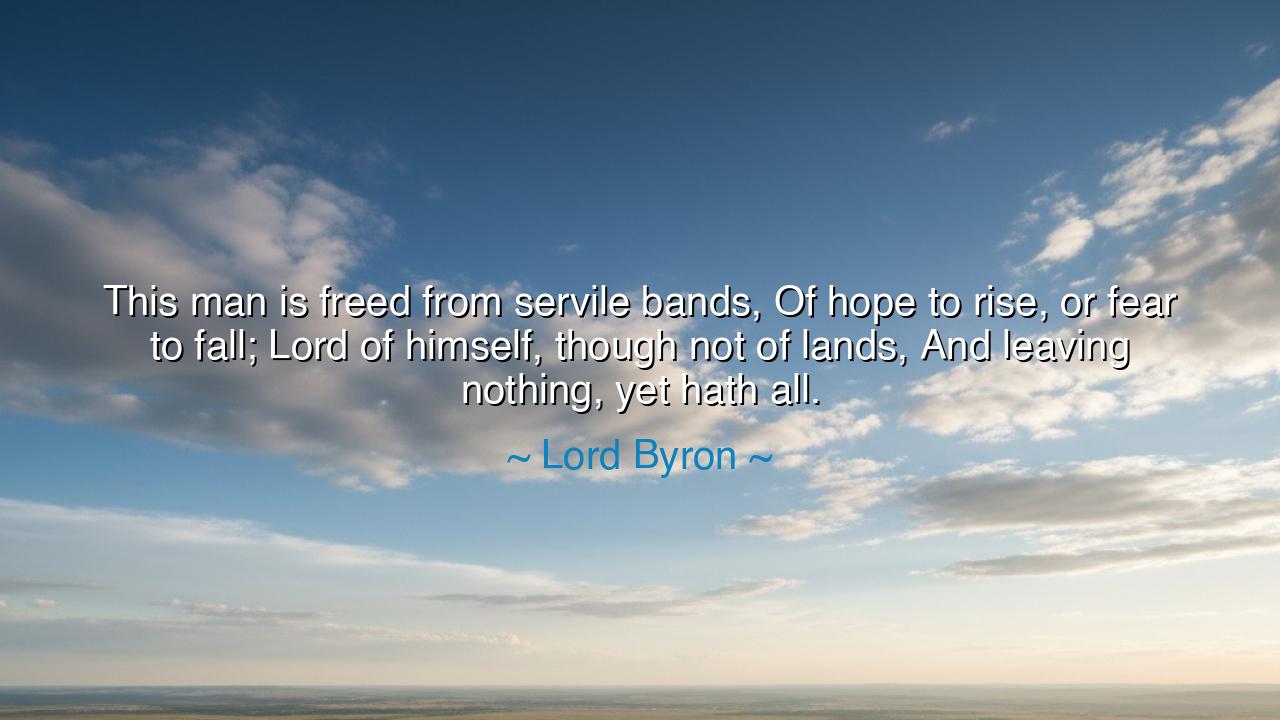
This man is freed from servile bands, Of hope to rise, or fear to
This man is freed from servile bands, Of hope to rise, or fear to fall; Lord of himself, though not of lands, And leaving nothing, yet hath all.






“This man is freed from servile bands,
Of hope to rise, or fear to fall;
Lord of himself, though not of lands,
And leaving nothing, yet hath all.”
Thus wrote Lord Byron, the tempestuous poet whose soul was both storm and light. These lines, born of his poem The Son of Honour, are no mere ornament of verse—they are a philosophy of freedom, a hymn to the spirit that stands sovereign within itself. In them, Byron paints the portrait of a man who, though he owns no kingdom, possesses the only empire that cannot be stolen: the empire of his own soul.
To be “freed from servile bands” is to be unshackled from the chains that bind most men—the endless hope to rise in worldly station and the fear to fall from it. Such hopes and fears are twin tyrants, ruling over the human heart with invisible chains. The ambitious man labors to climb, trembling at every step; the wealthy man fears loss, sleeping uneasily upon his gold. But the one who has mastered himself, who neither covets nor clings, walks in peace amid the turmoil of the world. He cannot be enslaved, for his freedom lies not in circumstance, but in character.
The ancients knew this truth well. The Stoic Epictetus, born a slave, declared that the only true freedom is inner freedom, and that no man may command the soul unless the soul consents. Though beaten and owned by another, he walked the earth as a philosopher-king, rich in virtue and calm in adversity. So too does Byron’s “freed man” resemble the Stoic sage: “Lord of himself, though not of lands.” His dominion is invisible yet infinite. He rules his passions as a monarch rules his armies; he commands his desires and bids them serve reason.
There is a tale from the East that speaks the same truth. When Alexander the Great came upon the philosopher Diogenes, he found him lying upon the ground, bathing in sunlight. Alexander asked what gift he might bestow upon him. Diogenes replied, “Stand out of my light.” In that moment, the conqueror of the world stood before a man who needed nothing—and therefore, could not be conquered. “Leaving nothing, yet hath all.” Diogenes owned no empire, but he possessed contentment, the rarest treasure of all. Alexander, though he ruled nations, could not claim the same.
The meaning of Byron’s words, then, is both defiant and divine. He speaks to those who seek peace in the restless markets of ambition and pride. He tells them that the one who releases desire gains all things, while the one who grasps at all loses peace. To be “lord of oneself” is to live without servitude to praise, envy, or despair. It is to dwell above fortune’s wheel, unmoved by its turning—to smile when lifted, to endure when cast down, and to remain whole through both.
This truth has been proven in every age. Consider Nelson Mandela, who spent twenty-seven years in prison and emerged with no wealth, no throne, yet with a serenity that shook the world. The walls could contain his body but not his spirit. He was the living image of Byron’s man: freed not by chains broken, but by self-mastery. He left the prison gates “leaving nothing,” yet he “hath all”—dignity, forgiveness, and the power to change the hearts of nations.
The lesson, my child of the modern storm, is clear: seek not dominion over others, but dominion over yourself. The truest liberty is not bought by gold, nor won by conquest—it is born from the quiet triumph of the soul that needs nothing to be whole. Do not be ruled by hope to rise or fear to fall, for both are mirages that fade with the dawn. Learn instead the stillness of self-command. Stand in the sunlight of your being and say, like Diogenes, like Byron’s noble spirit, “I am free.”
So live with grace, not grasping; give without counting; stand tall even when all else crumbles. Let the world take your fortune, your fame, your name—it cannot take your peace if you guard it well. For the one who has mastered his heart, who lives by truth and walks in humility, has already found the kingdom that no death can touch. He leaves nothing, yet truly, he hath all.






AAdministratorAdministrator
Welcome, honored guests. Please leave a comment, we will respond soon